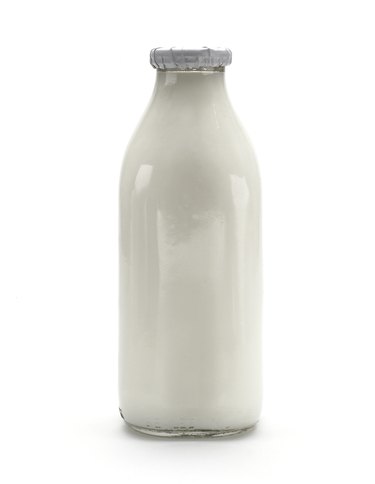
Milk offers a number of health benefits. It's rich in protein, good for your bones and may help keep your blood pressure in check. While some dairy products may benefit digestion, milk itself doesn't offer significant digestive benefits, and it may even cause digestive issues for some people.
Milk and Digestion
Video of the Day
Milk, for the most part, is a mixed food, containing carbohydrate, protein and fat -- unless, of course you drink fat-free milk. Milk digestion begins in the stomach, where acid and pepsin, the enzymes that breaks down protein, begin to digest the protein in the milk. From there, the small intestines continue the digestive process. The enzyme lactase breaks apart the lactose, which is the carbohydrate in the milk, and peptidases continue to break down the protein into amino acids for absorption. Bile and lipases help break down the fat in your low-fat or whole milk into fatty acids and glycerol, which are then absorbed into the bloodstream.
Video of the Day
Go Low-Fat or Nonfat
Whole milk may be harder to digest than low-fat or skim, according to NHS Choices. In addition to easing tummy trouble, drinking low-fat or nonfat milk is also better for your health. It's lower in calories than whole milk, which may help make it easier for you to stay within your calorie limits for weight control. Skipping whole milk also helps lower your intake of saturated fat, which is good for heart health.
Lactose Intolerance
Some people have a hard time digesting milk due to a lactose intolerance, which occurs when the small intestines cannot make enough of the enzyme lactase to digest lactose. Lactose intolerance is not dangerous, but it is common, affecting nearly 30 million adults, according to MedlinePlus. Symptoms of lactose intolerance include abdominal pain, diarrhea, gas or nausea. Limiting or avoiding milk helps prevent the discomfort. Instead, you can drink plant-milk alternatives such as soy milk, lactose-free milk or buttermilk.
Yogurt and Digestion
Milk you drink may not help digestion, but yogurt might. Yogurt is made from milk through a fermentation process using friendly bacteria. While studies are still underway, yogurt may help digestion by alleviating constipation and diarrhea, according to a 2004 review article published in The American Journal of Clinical Nutrition. People with lactose intolerance often seem to tolerate yogurt better than milk. The friendly bacteria in the yogurt may help digestion by repopulating the bacteria in your gut and improving transit time.
- NHS Choices: Good Foods to Help Your Digestion
- U.S. Department of Agriculture and U.S. Department of Health and Human Services: Dietary Guidelines for Americans, 2010
- HealthAliciousNess.com: Nutrition Facts Comparison Tool: Whole Milk, Nonfat Milk
- MedlinePlus: Lactose Intolerance
- Academy of Nutrition and Dietetics: Yogurt Mania